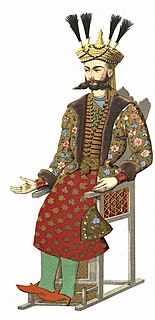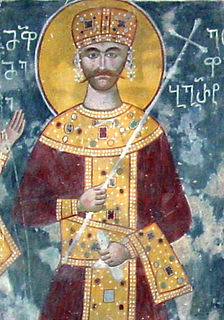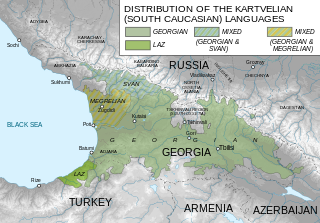
George V the Brilliant was King of Georgia from 1299 to 1302 and again from 1314 until his death. A flexible and far-sighted politician, he recovered Georgia from a century-long Mongol domination, restoring the country's previous strength and Christian culture.

Constantine II, of the Bagrationi dynasty, was a king of Georgia since 1478. Early in the 1490s, he had to recognise the independence of his rival rulers of Imereti and Kakheti, and to confine his power to Kartli. In 1505, Constantine II died, and was succeeded by his son David X.

Bagrat III (1495-1565), of the Bagrationi dynasty, was a King of Imereti from April 1, 1510, to 1565. He succeeded upon the death of his father, Alexander II, and faced repeated assaults from the Ottoman Turks as well as the conflicts with his ostensible vassal princes of Mingrelia, Guria, and Abkhazia who were frequently joining the enemy.

The House of Jaqeli was a Georgian princely (mtavari) family and a ruling dynasty of the Principality of Samtskhe, an offshoot of the House of Chorchaneli.

The Samtskhe Atabegate or Samtskhe-Saatabago, also called the Principality of Samtskhe, was a Georgian feudal principality in Zemo Kartli, ruled by an atabeg (tutor) of Georgia between 1268 and 1625. Its territory consisted modern Samtskhe-Javakheti region and the historical region of Tao-Klarjeti.

The Kingdom of Kartli was a late medieval/early modern monarchy in eastern Georgia, centered at the province of Kartli, with its capital at Tbilisi. It emerged in the process of a tripartite division of the Kingdom of Georgia in 1478 and existed, with several brief intermissions, until 1762 when Karti and the neighboring Georgian kingdom of Kakheti were merged through a dynastic succession under the Kakhetian branch of the Bagrationi dynasty. Through much of this period of time the kingdom was a vassal of the successive dynasties of Iran, but enjoyed intermittent periods of greater independence, especially after 1747.
Dedisimedi was a Georgian noblewoman of the House of Mukhrani, a collateral branch of the royal Bagrationi dynasty. She was princess consort of Samtskhe as wife of Kaikhosro II Jaqeli and regent for her son Qvarqvare IV Jaqeli. She played a leading role in a civil war that plagued Samtskhe from 1576 to 1578. After the Ottoman takeover of her principality, Dedisimedi retired to Kartli, leaving the government to her son, Manuchar II Jaqeli, who continued to rule as an Ottoman pasha.
Sargis II Jaqeli was a Georgian prince (mtavari) and ruler of Principality of Samtskhe from 1306 to 1334. He was a son of Prince Beka I Jaqeli. During his father's reign Sargis participated in many campaigns. In 1290s Azat Mousa, leader of the Anatolian Turkoman tribes, attacked Samtskhe. Beka Jaqeli appointed Sargis as a commander of army and ordered him to stop Turks near village Vashlovani. Around 1303, Sargis defeated Turkoman tribes and expelled them from Meskhetian lands. In 1306, after his father's death, Sargis ascended the Atabeg's throne. He was made Amirspasalar by his nephew, King George V "the Brilliant". After Sargis II's death His son Qvarqvare became a new Prince of Meskheti, also the vassal of Georgian kingdom.
Kaikhosro II Jaqeli, of the House of Jaqeli, son of Qvarqvare III, was prince of Samtskhe, ruling nominally in 1545–1573. Invested as a puppet ruler by the Ottomans in 1545, Kaikhosro II's tenure was marred by incessant Iranian–Ottoman rivalry, as well as uneasy relations with neighboring Georgian polities, and internecine feuds. The western part of his principality became quickly assimilated by the Ottomans and formed into a paşalık, while the eastern part came under Iranian suzerainty. In 1570, as a result of continued Ottoman aggression, Kaikhosro was forced to seek direct assistance from his suzerain king Tahmasp I at the Iranian royal court, where he died three years later as well.
Kakhaber II Gurieli, of the House of Gurieli, was eristavi ("duke") of Guria from c. 1469 until his death in 1483.
Rostom Gurieli, of the House of Gurieli, was Prince of Guria from 1534 until his death in 1564. Alongside his royal suzerain, Bagrat III of Imereti, Rostom fought against the expanding Ottoman Empire to which he lost parts of his principality. Rostom's relations with Bagrat III subsequently deteriorated over his support to the king's defiant vassal, Levan I Dadiani.
Qvarqvare I Jaqeli was a Georgian prince (mtavari) and ruler of Samtskhe during 1334-1361.
Beka II Jaqeli was a Georgian prince (mtavari) and ruler of Samtskhe from 1361 to 1391. He was appointed as Atabeg by his paternal relative, Georgian king Bagrat V. Since 1372 he had ruled Meskheti with his brother Shalva. Shalva died in 1389 and was replaced by his son, Aghbugha I. Beka II's authority in Samtskhe was lost During Timur's invasion of Georgia. After Timur's devastating campaigns Beka II turned away from king Bagrat and surrendered to the enemy. He died in 1391, leaving Atabeg's throne to his son, Ivane, who shared power with Aghbugha until 1395. Jaqeli dynasty lasted from Beka II's descendants.
Aghbugha II Jaqeli was a Georgian prince (mtavari) and Atabeg of Samtskhe from 1444 to 1451. He was a member of Jaqeli family, son of the energetic and separatist ruler Ivane II Jaqeli. In 1444, after his father's death Aghbugha was appointed as Atabeg by Georgian king Vakhtang IV, son of Alexander I The Great. Aghbugha's reign lasted for only 7 years. In this period He was fighting against his rebellious and arrogant brother Qvarqvare. In 1447 Aghbugha asked George VIII for help. Georgian king conducted military campaign against Qvarqvare, defeated and imprisoned him. After this Aghbugha reinstated power. He died in 1451 and was succeeded by his brother Qvarqvare II as the new atabeg.
Kaikhosro I Jaqeli was a Prince and Atabeg of Samtskhe-Saatabago, member of the Jaqeli family and son of Qvarqvare II. His reign lasted from 1498 to 1500. According to Kaikhosro's contemporaries, he was a wise and educated ruler. He held peace with the other Georgian kingdoms:Kartli, Kakheti and Imereti. Kaikhosro with king Alexander I of Kakheti and Constantine of Kartli agreed to assist first Safavid shah Ismail in destroying Aq Koyunlu rule in Persia. Atabeg Kaikhosro died in 1500 and was succeeded by his younger brother Mzetchabuk Jaqeli.
Mzetchabuk Jaqeli was a Prince and Atabeg of Samtskhe-Saatabago during 1500-1515, member of the Jaqeli family and son of Qvarqvare II Jaqeli. After his older brother's death Mzetchabuk had seized the Atabeg's throne from his nephew, Qvarqvare. He was an ambitious and arrogant ruler. Like his father and grandfather, Mzetchabuk demanded the separation of the Meskhetian church from the Georgian Orthodox church. Atabeg Mzetchabuk Strived to strengthen Samtskhe. He nominally obeyed Ottoman sultan Selim I and with his help Adjara came fully under Meskhetian rule. In 1515 old Mzetchabuk abdicated and became a monk, received a monastic name Jacob. After Mzetchabuk Atabeg's title would be given to his nephew Qvarqvare, but Mzetchabuk's younger brother Manuchar rebelled against him. The war for succession was won by Manuchar and he became the next Atabeg. Mzetchabuk Jaqeli died in 1516, at the age of 70-71.
Manuchar I Jaqeli was a Prince and Atabeg of Samtskhe-Saatabago from 1515 to 1518. He was a member of the Jaqeli family and youngest son of Qvarqvare II Jaqeli. After his older brother Mzetchabuk's abdication Manuchar started an uprising against his nephew Qvarqvare, the son of Kaikhosro I. Manuchar's revolt finished successfully and he ascended to the Meskhetian throne. During his brief reign Manuchar sent many gifts to the Ottoman sultan Selim I and claimed himself as an admier of Ottomans. In 1518 the new revolt started. Prince Qvarqvare with the help of Safavid troops attacked Samtskhe. Manuchar was overthrown and Qvarqvare became the new ruler of Meskheti. After this Manuchar asked his suzerain Sultan Selim for help. Sultan gave him the huge army. He had tried to restore himself as Atabeg, but was defeated by Qvarqvare's forces at the battle near Erzurum. Manuchar Jaqeli escaped to the Ottoman empire and lived there until his death. Nothing is known about his later life and descendants.
Qvarqvare III Jaqeli was a Georgian ruling Prince and Atabeg of Samtskhe-Saatabago during 1518–1535. Member of the Jaqeli family and son of Atabeg Kaikhosro I Jaqeli. His failure to capture the throne at the death of his father Kaikhosro may have been caused by the ambition of his uncle Mzetchabuki, who had seized Atabeg's title from him. Despite of this Mzetchabuk Jaqeli declared Qvarqare as his successor. During his uncle's reign Qvarqvare actively involved in state affairs. In 1515 ill Mzetchabuk resigned from the throne and came to the Monastery as a monk. Qvarqvare couldn't ascend to the Meskhetian throne, because his second uncle Manuchar I had revolted. Qvarqvare went to Safavid Persia, became vassal of Shah Ismail I and lived at his court in Tabriz until his accession. In 1518 Qvarqvare commanded Qizilbash army and invaded Samtskhe. Persians dethroned Manuchar I and placed Qvarqvare on the throne. Manuchar invited Ottomans to fight against Safavids and overthrow his nephew, but Qvarqvare's forces defeated him at the battle near Erzurum, after which Manuchar escaped to the Ottoman empire. During Qvarqvare's reign Persian influence on Samtskhe was growing day by day. Because of that Turks greatly damaged the country and especially it's southwestern region. Meskhetian lords had recognized that under Qvarqvare's rule Samtskhe would finally turn to the Enemy's hands. They made an alliance with the Georgian kings, Bagrat III of Imereti and Luarsab I of Kartli to end up Jaqelian rule and protect Samtskhe from dominant Muslim empires (Ottomans and Safavids. In 1535 King Bagrat III invaded Samtskhe. He defeated and captured Qvarqvare III at the Battle of Murjakheti near Akhalkalaki, Georgians had annexed Principality of Samtskhe. Qvarqvare died in prison. A few years later, his survived youngest son Kaikhosro II requested Ottomans to expel Imeretian and Kartlian forces from Samtskhe. In 1545, at the Battle of Sokhoista, Kaikhosro defeated Bagrat III, after which he reinstated his legitimate throne. Samtskhe became vassal of the Ottoman empire. Qvarqvare III's descendants ruled Samtskhe-Saatabago and then Childir Eyalet until 1820s.

Qvarqvare IV Jaqeli was a Georgian Prince and Atabeg of Samtskhe-Saatabago, ruling nominally in 1573–1581. He was member of the Jaqeli family and the son of Kaikhosro II Jaqeli. During his nominal reign Meskhetian lords revolted several times against Jaqelian rule. Uprisings were suppressed by Ottomans. In 1578 Ottomans started new war against Safavid Persia for the hole territory of Caucasus. Lala Mustafa Pasha invaded Georgia. Qvarqvare IV obeyed him. Pasha had decided to send Qvarqvare and his younger brother Manuchar to Constantinople for recognizing Ottoman absolute rule in Samtskhe. Qvarqvare left the government to his mother, Dedisimedi and went to the capital of the Ottoman Empire. In 1579 by the order of Sultan Murad III Ottomans divided Samtskhe-Saatabago into eight Sanjaks and established Childir Eyalet on the lands of Meskheti. Qvarqvare IV was appointed as Christian ruler of Childir Eyalet, but his brother Manuchar converted to Islam under the name of Mustafa and became the Ottoman Pasha. Qvarqvare died childless in 1581 and was succeeded by his Muslim brother Manuchar II.








